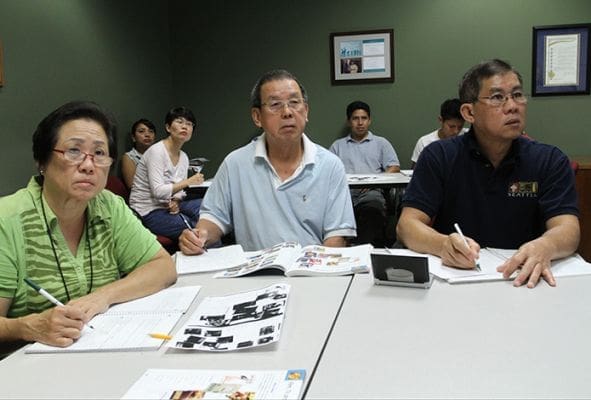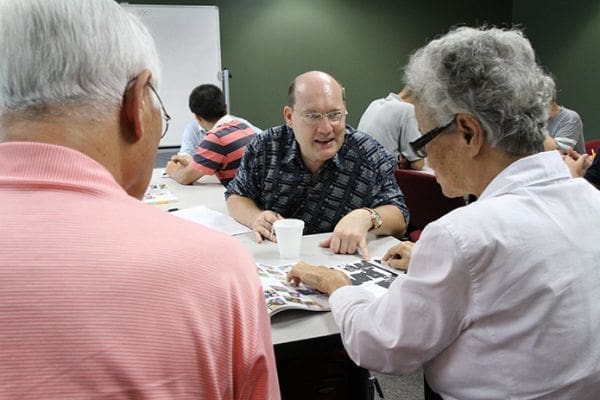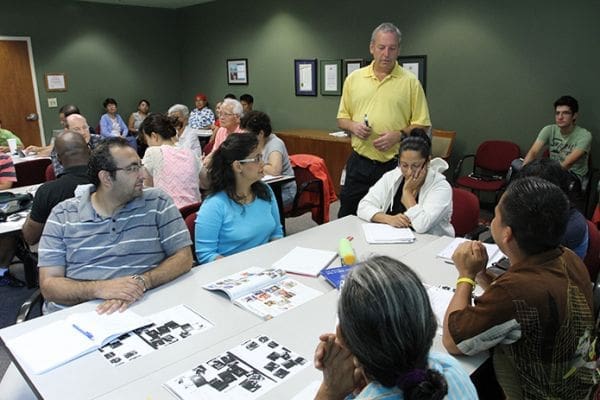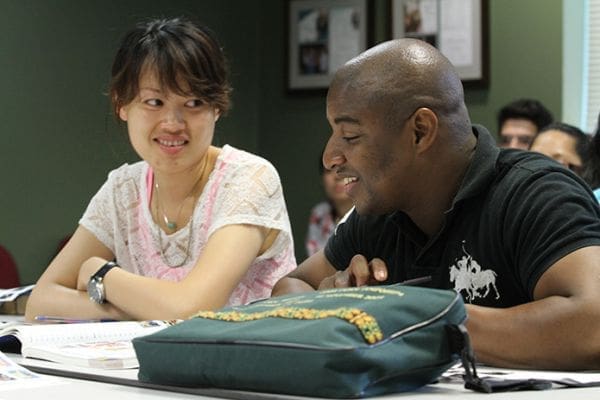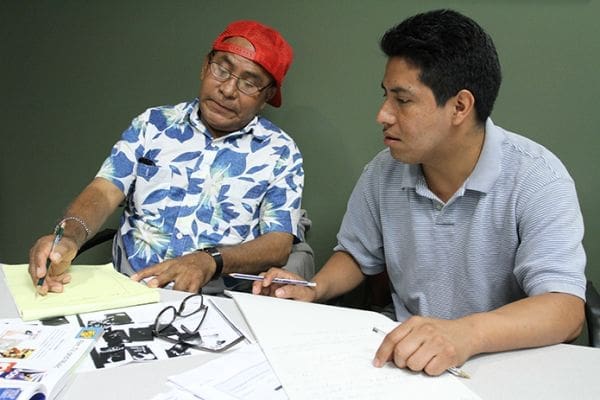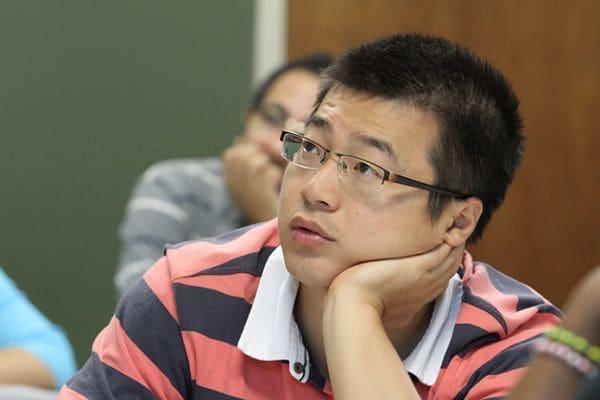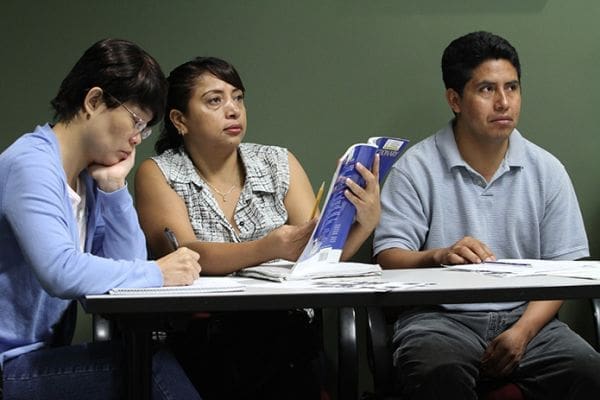Njuk Jong, her husband Kusok Pak and Freddy Hendrawan study the sentences on the board each person took a turn constructing in English. The three students are from Indonesia. Photo By Michael Alexander
Atlanta
Free English classes give immigrants freedom, better opportunities
By LINDSAY WOOD Special to the Bulletin | Published August 15, 2013
ATLANTA—Last year Catholic Charities Atlanta’s English Literacy and Civics program improved the lives of 144 non-English speaking immigrants one syllable at a time.
This federally funded grant program teaches adult students English within a cultural context. Increasing the students’ language proficiency not only helps immigrants find better job opportunities and earn citizenship, but it allows them to lead more independent and full lives.
In some cases it’s as simple as being able to pass a driver’s license test, said Loretta Siefferman, Catholic Charities Atlanta’s manager of adult education services.
Being able to communicate in English with native speakers is a huge boost in self-esteem for those who have been in this country for 10 to 15 years and unable to speak the language.
Just ask Manuel Rangel, 38, who has been attending the EL Civics classes twice a week for the past four years.
“I feel better,” Rangel said. “I was very shy a long time ago when I was standing in line with Americans at McDonald’s. I had to point to the menu board.”
Rangel couldn’t tell the McDonald’s employee that he wanted a number eight and no pickles on the burger please — a challenge that no native English speaker gives a second thought.
Now Rangel, a native of Mexico, talks of using the present progressive tense and his confidence in public.
“When Americans talk to me I can answer questions back,” he said. “It’s never too late to learn another language.”
Since 2006, the EL Civics classes have helped more than 2,500 students improve their English literacy skills.
The program’s students come from places as far flung as Russia, Korea, Egypt, Ethiopia and Belarus as well as neighboring Mexico and other Latin American countries.
“It’s like a mini UN,” said Siefferman, who started as a class instructor with the program in 2005.
Catholic Charities Atlanta offers free EL Civics classes in two locations, Chamblee and Sandy Springs, three times a week. Each class lasts three hours. Participants are expected to complete a total of 60 hours per semester.
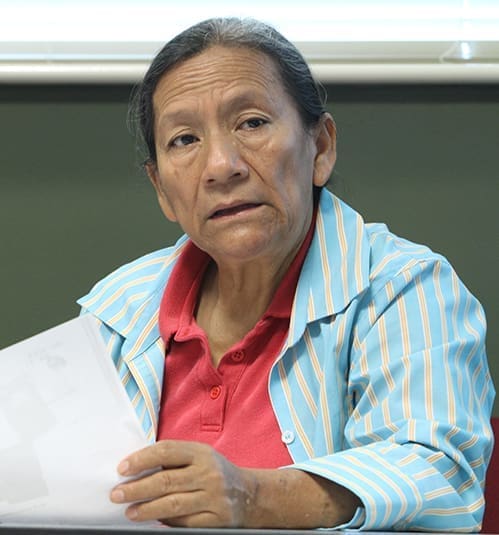
Adelissa Arteaga of Peru listens to the instructor explain the directions for the English exercise. Photo By Michael Alexander
With each 60 hours of completion, students are given an assessment test to determine if their English has improved. If improvement is shown, students are moved up to a more advanced class.
Lead instructor James McDonough teaches his students through themed dialogue exercises and vocabulary and grammar exercise games during the first 75 minutes of class time. Then students are broken up into beginner, intermediate and advanced groups for more individualized study under the guidance of program volunteers. More volunteers are always needed.
The EL Civics class follows the same guidelines as the technical college programs in Georgia.
The biggest hurdle teachers must overcome isn’t a language barrier though. It’s retention rates.
“The dropout rate is like 50 percent,” McDonough said, “so we know going into a class that if you start out with 60 students, you’re going to end up with about 30 at the end of the semester if you’re lucky.”
It’s not that the students don’t want to learn. Staying in class is a matter of finding reliable transportation, securing child care in some cases and fighting mental exhaustion.
Last year 56.9 percent of students were between the ages of 25 and 44. Nearly 35 percent were 45 and older. More than half were employed like Raul Garcia, 36, who is both a taxi driver and painter.
Trying to juggle two jobs plus six hours a week of classes is tough for Garcia, but it’s imperative for him to get ahead.
“I tell my boss I need to go practice my English,” Garcia said.
From July 2012 to June 2013, 47 percent, or 68 out of 144 students, increased their proficiency, proving that the program is working.
“We have found that once you get them even to the first level of English, it opens a lot of doors for them through work, through their children’s schools and just in the community itself,” instructor McDonough said. “There is a large need to help these people with language, which is the first step to assimilation. We’re kind of the last place people can go for free help.”
Those interested in attending a class may contact Loretta Siefferman at 770-790-3104. There is also a great need for volunteers to help others learn English. To volunteer, contact Margaret Prickett at 404-920-7785.
